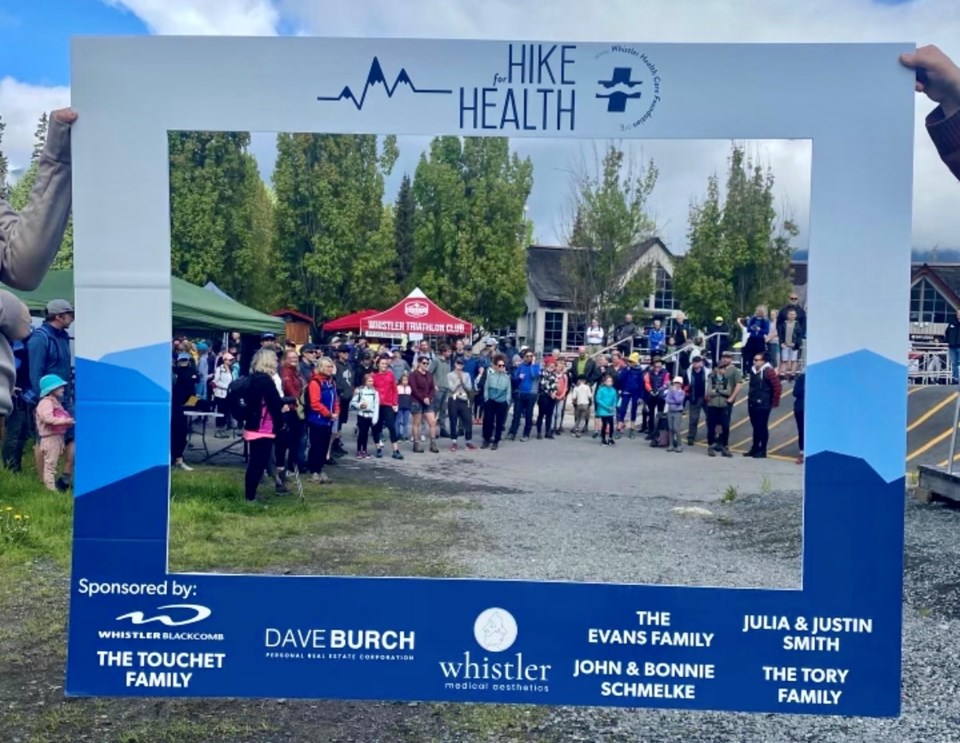Last year’s inaugural Hike for Health fundraiser was a resounding success for the Whistler Health Care Foundation (WHCF). That wasn’t just due to a sold-out field of more than 200 participants who came out to enjoy what felt like the first sunny day in months, or the $80,000 the event raised for health-care in Whistler, but to its remarkable impact.
As Jen Black, vice-chair of the WHCF’s board of directors explained, those funds helped purchase new equipment for the Whistler Health Care Centre’s emergency department, including a GlideScope. Two days after staff were trained to use the device, the WHCF received a note: Whistler ER doctors had used the equipment to successfully treat a young patient suffering from a blocked shunt.
“So glad we had that upgraded tool to intubate him,” they wrote. “Please let the foundation know that their contribution saved another life.”
Organizers expect Hike for Health—and its impacts—to be even bigger and better when the event returns to Blackcomb Mountain’s Ascent Trails this year on Father’s Day, Sunday, June 18.
Hikers can choose between three distances—the Little Burn, Big Burn and Heartburn trails, weather permitting—or opt to skip the “hike” portion of the event and ride the Blackcomb Gondola instead. Entry fees include a single-day sightseeing pass and a $10 food voucher from Whistler Blackcomb, as well as refreshments at the trailhead and the finish line.
Organizers increased the registration cap to 300 this year. “We’re very grateful to Whistler Blackcomb for upping the number of sightseeing passes and food vouchers,” said Black. “We’re really hoping because of last year’s success, friends will tell friends and it’ll be a not-to-miss event on the 18th.”
Before hikers set off next month, organizers are seeking sponsors for the event. “Trailblazer” status will be bestowed on any individual, group or business that donates $500, $1,000, $5,000 or $10,000 to the cause. Trailblazers receive recognition on the day of the event, access to an exclusive check-in area the morning of, and limited-edition “trailblazer” merch.
“It’s just a really great way to put back into the local health-care system that has given us so much over the last number of years,” said Black.
With $20,000 from title sponsor the Touchet family already in the bank, the WHFC hopes to see Hike for Health’s overall tally hit $100,000 this time around.
All proceeds will benefit the WHFC’s Dr. Rob Burgess Primary Care Fund and, by extension, the Whistler 360 Health Collaborative Society, to help improve primary care access in the community.
Since assuming operations of the Whistler Medical Clinic on Jan. 1, the innovative, locally-governed non-profit has welcomed two new doctors who are currently building up their own panel of patients, and opened a satellite clinic on Main Street. Whistler 360 will welcome a nurse practitioner to its staff next month, and is in the process of hiring another who would begin seeing patients in August or September.
Whistler 360 chair Carol Leacy said more than 2,000 locals seeking a primary care provider have added their name to Whistler 360’s patient registry since it opened this winter.
Of those, 650 have so far booked patient-intake appointments with their new doctor. Eventually, each full-time care provider would see their panel max out at between 800 and 1,200 patients, said Leacy, but “you don’t want to sign up a whole bunch of people [at once], otherwise no one would ever have access, so it’s sort of a process to build it up.”
Leacy encouraged any Whistlerites without a general practitioner to add their name to the list if they haven’t already.
In particular, Leacy said an influx in funding from Hike for Health could “go a long way” in helping explore whether a team-based care model could work for Whistler 360.
“So instead of just [hiring] a doctor or nurse practitioner and then attaching 1,000 patients—because we still have limited doctors and nurse practitioners—there are some models that have been proven to be effective across the province where you introduce, say, a [registered] nurse into the practice … [who] works in conjunction with a doctor or two doctors to try and flip the patient demand of the day in a way where the nurse handles patients that would be more appropriately seen by a nurse, and the doctors work in tandem with them,” she explained. “It’s all still done under the same electronic medical records, but it [leads to] better patient outcomes; it should be a better patient experience and also allow greater patient throughput without needing to add another doctor.”
The model is intended to be cost-neutral over time, but to pilot a new process and hire a contract nurse requires upfront investment, Leacy added.
Even with the Hike for Health money flowing to primary care, the funding will still have positive spin-off effects for the acute-care situation in Whistler’s emergency room, said Black.
“As we have more primary care physicians through Whistler 360, it eases up the pressure on our health-care centre,” she explained. “So it really benefits everyone, whether or not you need a primary care provider in Whistler.”
Hike for Health tickets are $40 per adult, $25 for youth aged seven to 18, and free for kids under six. Visit whistlerhealthcarefoundation.org/hike-for-health to register, or for more information about sponsoring the fundraiser.




